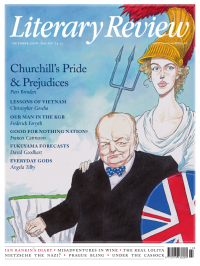Tom Stern
All Too Human
I Am Dynamite! A Life of Friedrich Nietzsche
By Sue Prideaux
Faber & Faber 444pp £25
Sue Prideaux’s biography tells a familiar story. Born into a religious family, Friedrich Nietzsche is a brilliant young student of philology, not philosophy, and soon becomes a professor in Basel, bewitched by Schopenhauer’s philosophy and by Wagner’s music, personality and wife. He breaks with Wagner to commence a nomadic life, especially in the Mediterranean and the Alps, funded by a generous pension (this is one of the few stories you are likely to read in which the most humane, generous and open-minded character is the university administration). Nietzsche is a gentle, troubled genius, unlucky in love, plagued by miserable health, whose mild personality contrasts dramatically with his bombastic prose. He goes mad in 1889 and dies in 1900, at which point the evil sister, Elisabeth, seizes control of his literary estate and aids in his disastrous misappropriation by the Nazis. The apolitical, individualistic and cautious philosophy of a man who hated anti-Semites and German nationalists is converted, tragically, into frothing, war-hungry, racist brutality – an error the storyteller seeks to correct. Prideaux’s biography ends in the gardens of the Weimar villa in which Nietzsche died, from where the modern visitor can gaze down to the chimney of Buchenwald concentration camp. The message is clear: Elisabeth invites the Nazis round to dance on Nietzsche’s grave, while he meekly turns within it.
Prideaux’s telling is lively and engaging. She has a talent for setting the scene and a novelist’s imagination, eye for detail and turn of phrase. Richard Wagner bellows Saxon-tinged obscenities into an echo spot and then roars with laughter when they find their way back to him. Bernhard

Sign Up to our newsletter
Receive free articles, highlights from the archive, news, details of prizes, and much more.@Lit_Review
Follow Literary Review on Twitter
Twitter Feed
It wasn’t until 1825 that Pepys’s diary became available for the first time. How it was eventually decrypted and published is a story of subterfuge and duplicity.
Kate Loveman tells the tale.
Kate Loveman - Publishing Pepys
Kate Loveman: Publishing Pepys
literaryreview.co.uk
Arthur Christopher Benson was a pillar of the Edwardian establishment. He was supremely well connected. As his newly published diaries reveal, he was also riotously indiscreet.
Piers Brendon compares Benson’s journals to others from the 20th century.
Piers Brendon - Land of Dopes & Tories
Piers Brendon: Land of Dopes & Tories - The Benson Diaries: Selections from the Diary of Arthur Christopher Benson by Eamon Duffy & Ronald Hyam (edd)
literaryreview.co.uk
Of the siblings Gwen and Augustus John, it is Augustus who has commanded most attention from collectors and connoisseurs.
Was he really the finer artist, asks Tanya Harrod, or is it time Gwen emerged from her brother’s shadow?
Tanya Harrod - Cut from the Same Canvas
Tanya Harrod: Cut from the Same Canvas - Artists, Siblings, Visionaries: The Lives and Loves of Gwen and Augustus John by Judith Mackrell
literaryreview.co.uk